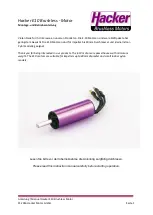
Chapter 1
BASIC SAFETY PRECAUTIONS
1-5
Caution Service Bat-
tery
Handle battery carefully
• Batteries release flammable
hydrogen gas and oxygen.
Never use flames or generate
sparks near the battery since
flames or sparks can cause
an explosion.
• Do not use the battery when the fluid surface is
lower than the minimum required level. Using a
battery with a low electrolyte level can result in an
explosion.
• Do not short the battery terminals with a tool or
other metal object.
• When disconnecting battery cables, remove the
cable from the negative (-) terminal first. When
reconnecting cables, attach the cable to the posi-
tive (+) terminal first.
• Charge the battery in a well-ventilated area, with
all filling hole plugs removed.
• Make sure the cable clamps are securely
installed on the battery terminals. A loose cable
clamp can cause sparks that may result in an
explosion.
• Before servicing electrical components or con-
ducting electric welding, set the battery switch to
the [OFF] position or disconnect the cable from
the negative (-) battery terminal to cut off the
electrical current.
• Electrolyte contains dilute sulfuric acid. Careless
handling of the battery can cause loss of sight
and burns.
• Wear safety goggles and rubber gloves when
working with the battery (replenishment of fluid,
charging, etc.)
• If electrolyte is spilled on skin or clothes, wash
immediately with lots of water. Then, use soap to
clean thoroughly.
• If electrolyte enters eyes, flush immediately with
lots of fresh water and see a physician as soon as
possible.
• Should you accidentally swallow electrolyte, gar-
gle with plenty of water, then drink lots of water.
Consult a physician immediately.
Caution When Abnor-
mality Occurs
If engine overheats, conduct cool-
ing operation before stopping
engine
If the engine overheats, do not stop the engine
immediately. Abrupt stopping of an overheated
engine may cause the coolant temperature to rise,
resulting in seizing of the engine. If the engine over-
heats, operate the engine at low idling speed (cool-
ing operation), and stop the engine after the coolant
temperature lowers sufficiently.
Do not add coolant immediately after stopping the
engine. Adding coolant to a hot engine may cause
damage to the cylinder head from sudden change
in temperature. Add coolant gradually after the
engine cools to room temperature.
If engine stops due to abnormal-
ity, exercise caution when restart-
ing
If the engine stops due to an abnormality, do not
restart the engine immediately. If the engine stops
with an alarm, check and correct the cause of the
problem before restarting. Operating the engine
without correcting the problem may result in serious
engine problems.
If engine oil pressure drops, stop
engine immediately
If the engine oil pressure decreases, stop the
engine immediately, and inspect the lubricating sys-
tem including the oil level and pump. Operating the
engine with low oil pressure may cause seizing of
bearings and other parts.
If V-belt breaks, stop engine
immediately
If the V-belt breaks, stop the engine immediately.
Continued operation of the engine without the V-
belt will cause the alternator to stop working.
Continued operation of the engine without the V-
belt in place causes coolant to change into steam
and blow out, thus resulting in burns.
















































